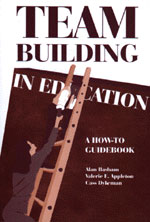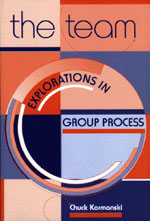 |
| >TEAM BUILDING IN EDUCATION |
Alan Basham and Valerie Appleton, Eastern Washington University
Cass Dykeman, Oregon State University
This guidebook presents both a rational and specific technique for improving teamwork in educational settings. You'll find information on creating effective teams and what makes them work. It shows how to increase collaboration and teamwork among educators, social workers, school counselors, psychologists, community leaders, and parents.
It is designed to provide a blend of research and organizational development theory, step-by-step processes for leading team-building meetings, and information to expand leadership qualities.
Special Features
- Addresses the issues of motivation, group dynamics, and the progressive team-building process
- Includes handouts and experiential exercises
- Shows how to conduct booster sessions to help energize teams
- Presents the differences between being a manager, a pseudo leader, and a genuine leader
Contents
1. Introduction
2. Creating Effective Teams
3. Pitfalls, Resistance, and What You Already Know
4. Team-Building Preparation
5. Beginning the Process
6. Assessment in Team-Building
7. Problem-Solving and Decision-Making
8. Goal Setting and Implementation
9. Conducting a Booster Session
10. The Ethics of Team-Building and Leadership
11. Building a Crisis Team
12. Training Team-Building Consultants
13. Conclusion
242 pages
2000/paperback/ISBN 978-0-89108-267-5
$34.95 |
 |
|
|
|
 |
>THE TEAM
Explorations in Group Process |
| Charles Kormanski, Penn State University, Altoona
The Team provides a comprehensive introduction to group process. It is a must for any professional or leader who desires an understanding of task accomplishment through teamwork. The core of The Team is an integration of a series of models and theories to understand the dynamics of change and how a team approach can influence the change process. The text looks at the development of current theory by examining the philosophical underpinnings of group process and theory.
You'll find chapters covering group development stages, change, conflict, leadership style, team building, diversity, applications and much, much more. The pragmatic approach of the book makes each concept and theory easy to understand.
Contents
1. Introduction
2. Group Development Stages
3. Change and Conflict
4. Leadership
5. Leadership Style
6. Team Building
7. Team Member Diversity
8. Team Performance
9. Concluding Thoughts
240 pages
1999/paperback/ISBN 978-0-89108-260-6
$32.00 |
 |
|
|
|
 |
>COLLABORATIVE PRACTITIONERS, COLLABORATIVE SCHOOLS
Second Edition |
Marleen Pugach, University of Wisconsin-Milwaukee
Lawrence Johnson, University of Cincinnati
This latest revision has a strong focus on teamwork and includes new material on reconceptualizing collaboration and team-based problem solving.
The authors give us a powerful vision of schools as learning communities, not just for students, but also for adults, teachers, parents, and school administrators. This second edition has been expanded to include interagency connections and ways to develop partnerships with schools. The school–family collaboration chapter covers cross-cultural situations and gives practical strategies. Much more emphasis is given to diversity in this revision.
You’ll find proven activities and checklists at the end of each chapter. Problem solving, team teaching, and working with supporting groups are all part of this second edition.
Contents
- Collaboration and the Complex Work of Teaching
- A Multidimensional Framework for Collaboration
- Communication: The Foundation of Collaboration
- Skills to Facilitate Effective Communication
- Barriers to Effective Communication
- Working With and Supporting Groups
- Collaboration as Classroom and School-Wide Problem Solving
- Team Teaching as Collaboration
- Collaboration and School Partnerships
- School–Family Collaboration
Special Features
- Covers basic skills to facilitate communication
- Includes numerous activities to experience collaboration
- Teaches strong, effective teamwork skills
- Focuses on schools as learning communities
2002/Paperback/252 pages
ISBN 0-89108-293-X
$39.95
|
 |
|
|
|
|



